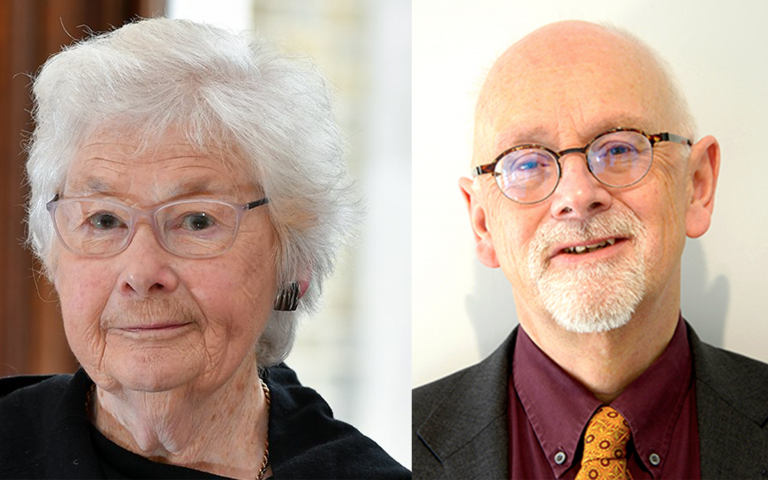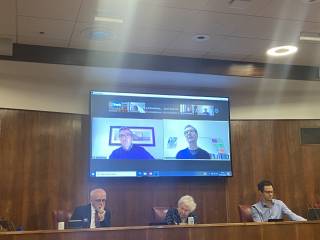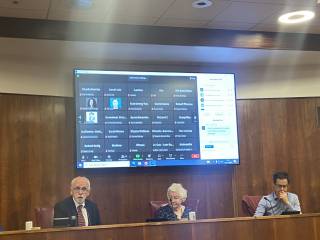Hybrid | Administrative Law and Populism: Reshaping the Relationship
16 January 2023, 11:30 am–1:00 pm

This event is organised by the UCL Public Law Group
Event Information
Open to
- All
Organiser
-
UCL Laws
Location
-
UCL Faculty of LawsBentham House4-8 Endsleigh GardensLondonWC1H 0EG
Speakers:
Prof. Carol Harlow (LSE) and Prof Rick Rawlings (UCL)
About the Paper:
The widespread resurgence of populist discourse and influence is a familiar topic of public debate. The role and place of administrative law is however generally neglected in the burgeoning literature, despite bearing directly on the form and quality of relations between government and governed. This paper adopts several different angles of approach with a view to making good the deficiency. A mix of theoretical and practical perspectives reflects the highly challenging nature of the subject-matter.
We are administrative lawyers with a long-held concern for the human face of government and interest in the uses made of law by the administration. We do not wish for populist government but we think it important not to close our ears to all lines of populist argument. We consider populism contains some important messages for administrative lawyers to digest and act on.
In section 1 of the paper, we draw out key themes from the wider literature on populism of particular relevance for administrative law. Section 2 highlights potential implications for administrative law of populist government, emphasising the practical dimension. Reversing the lens, we consider in section 3 how classic models or ‘poles’ of administrative law sit with populism. Section 4 expands on this line of inquiry, factoring in liberal constitutionalism and economic liberalism as chief contemporary influences in our subject, as well as the burgeoning influence of new technological ideas. Expressing concern over the ‘disconnect’ associated with modern governance and resonant in the populist challenge, in the final section we stress the importance of constructive responses in administrative law based on concepts of participation and citizen ‘voice’.
Images of our panellists during the talk from within the Moot Court, from L-R: Professor Rick Rawlings (UCL), Professor Carol Harlow (LSE) and Professor Jeff King (UCL).


- About the Speakers
Carol Harlow is Emeritus Professor of Law at the London School of Economics, where she was previously Professor of Public Law. Her interests lie in the field of public and comparative law . She was made Queens Counsel (honoris causa) in 1996, is a Fellow of the British Academy and of the London School of Economics and is a Bencher of the Middle Temple.
She was a Visiting Fellow at the University of New South Wales and the Australian National University, Canberra, Legal Research Fellow at the University of Auckland. She has many links with Europe and was Visiting Professor at the European University Institute and Rapporteur General at the Conference of International Academy of Administrative Sciences in 2000. She has served on several government committees, most recently on the Independent Review of Administrative Law.in 2021.
Carol Harlow is the author and editor of several books, most notably Law and Administration with Professor Richard Rawlings, now in its 4th edition
Professor Richard (Rick) Rawlings is the Professor of Public Law at UCL. He is a Fellow of the British Academy (FBA), Fellow of the Learned Society of Wales (FLSW), and Honorary Bencher at Middle Temple. He is a former Leverhulme Major Research Fellow. Rick has also been appointed Honorary Distinguished Professor at Cardiff University.
Rick's many works include leading monographs and edited collections such as Law and Administration (4th edn 2021) (with Carol Harlow); Delineating Wales: Constitutional, Legal anbd Aministrative Aspects of National Devolution (2005); The Regulatory State: Constitutional Implications (2010); Sovereignty and the Law (2013); Process and Procedure in EU Administration (2014) (with Carol Harlow). Reports include Challenge and Opportunity: The Draft Wales Bill (2016) and Brexit and the Territorial Constitution (2017). Rick has held visiting posts at leading universities in the common law world such as University of California, Berkeley; National University of Singapore; and University of Auckland. He was recently Miegunyah Distinguished Visiting Professor at Melbourne University. Rick has served as Legal Adviser to the House of Lords Constitution Committee and on the (Thomas) Commission on Justice in Wales. He currently serves on the Welsh Advisory Committee of the Law Commission.
- The Commentators

Richard Bellamy joined UCL in 2005 as the College's first Professor of Political Science. He was the founding Head of the new Department of Political Science and Director of the School of Public Policy from 2005- 2010. He was then Director of UCL’s European Institute, which he also established, from 2010-2013.
Read more about Richard Bellamy.
Bojan Bugarič is Professor at the University of Sheffield, Department of Law; and Associate Fellow, SPERI (Sheffield Political Economy Research Institute). He was previously Professor of Law at the University of Ljubljana, Faculty of Law. His research focuses on constitutional law, law and political economy of European integration and law and development. His recent work includes, with Mark Tushnet, Power to the People: Constitutionalism in the Age of Populism (OUP, 2021); with Mark Tushnet, Populism and Constitutionalism: An Essay on Definitions and Their Implications, 42 Cardozo Law Review, 2345 (2021), Populist Constitutionalism- Between Democracy and Authoritarianism, in M.Krygier, A.Czarnota. W.Sadurski, eds., Anti-Constitutional Populism (CUP; 2022); with Mark Tushnet, Constitutionalism and Its Discontents (forthcoming, 2023).
- About UCL Public Law Group
The UCL Public Law Group is a community of scholars working in the field of public law, broadly understood. Our aim is to provide a supportive forum for the discussion and development of theoretical and doctrinal questions in constitutional theory, comparative constitutional law, human rights, judicial review, legal and political theory, and more.
 Close
Close

